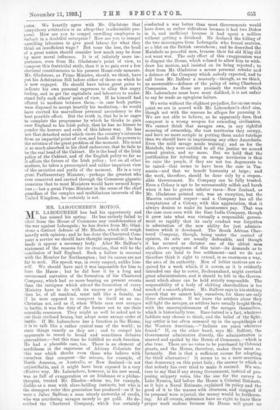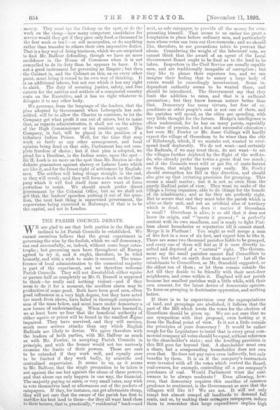MR. LA.BOUCHERE'S MOTION.
MR. LABOUCHERE has had his opportunity and has missed his spring. He has entirely failed to elicit from the House of Commons any condemnation of the war against Lobengula ; he has drawn from Mr. Glad- stone a distinct defence of Mr. Rhodes, which will weigh heavily with opinion; and he has done the Chartered Com- pany a service we should have thought impossible ; he has made it appear a necessary body. After Mr. Balfour's statement of the reasons for its creation, that will be the conclusion of half England. Such a failure is unusual with the Member for Northampton ; but its causes are not far to seek. His speech was, in every respect, unlike him- self. We should have said it was impossible for him to bore the House ; but he did bore it by a long and envenomed narrative of the formation of the Chartered Company, which had no more bearing on present events than the intrigues which attend the formation of every Ministry have to do with its success or policy. And then he, of all mankind, must talk like a fanatic, as if he were opposed to conquest in itself as an un- Christian act, and as if, when White men met savages in battle, it was the duty of the former not to use their scientific resources. They might as vell be asked not to use their civilised brains, but adopt some savage order of battle. If Mr. Labouchere has a function in the House, it is to talk like a. rather cynical man of the world ; to state things exactly as they are ; and to compel his opponents to resort to broad and sometimes delusive generalities ;—but this time he fulfilled no such function. He had a plausible case, too. There is an element of sordidness in the eagerness of African Colonists for this war which shocks even those who believe with ourselves that conquest —the seizure, for example, of North America, or Australia, or New Zealand—is not unjustifiable, and it might have been exposed in a very effective way. Mr. Labouchere, however, in his new mood, was as full of exaggeration as an Irishman or a philan- thropist, treated Mr. Rhodes—whom we, for example, dislike as a man with slave-holding instincts, but who is the strongest ruler this generation has produced—as if he were a Jabez Balfour, a man utterly unworthy of credit, who was murdering savages merely to get gold. He de- scribed the Chartered Company, which has certainly conducted a war better than most Governments would have done, as rather ridiculous because it had two Dukes in it, and inefficient because it had spent a million without getting a dividend. He declared the killing of the two messepgers from Lobengula who forced sentries, as a blot on the British escutcheon ; and he described the Matabele as peaceful men, because their fat old King did not want war. The only effect of this exaggeration was to disgust the House, which refused to allow him to with- draw his motion, and insisted on its being rejected ; to draw from Mr. Gladstone a severe personal rebuke and a defence of the Company which nobody expected, and to call from Mr. Balfour a masterly—though, as we think, an answerable—defence of the policy of using Chartered Companies. As those are precisely the .results which Mr. Labouchere must have most disliked, it is not unfair to say he made an egregious failure.
We write without the slightest prejudice, for on one main point we are in accord with Mr. Labouchere's chief aim, though not with the reasons he alleges for pursuing it We are not able to believe, as he apparently does, that conquest is a wrong weapon for extending civilisation. We cannot think that savages own, in any rightful meaning of ownership, the vast territories they occupy, and have no more scruple in putting them under tutelage than we should have in imprisoning any other Anarchists. Even the mild savage needs training; and as for the Matabele, they were entitled to all the justice we accord armed pirates, and no more. But we hold that the justification for intruding on savage territories is that we raise the people, if they are not too degenerate to be raised—that seems to have been the case in Tas- mania—and that we benefit humanity at large; and the work, therefore, should be done only by a respon- sible Government. No Company can be fully trusted. Even a Colony is apt to be unreasonably selfish and harsh when it has to govern inferior races—New Zealand, as Mr. Gladstone pointed out, was an exception, but the Maories extorted respect—and a Company has all the temptations of a. Colony, with this aggravation, that it always desires to make its harsh nesses pay. That was the case once even with the East India Company, though it grew into what was virtually a responsible govern- ment so rapidly that its early conduct was forgotten in admiration of the new ability for just adminis- tration which it developed. The South African Char- tered Company, though, being under the control of opinion, its acts are usually defensible, and though it has secured as dictator one of the ablest men alive, shows symptoms of this taint—its demands as to royalties are fatal to free settlement—and we do not therefore think it right to extend, in so enormous a way, the area of its authority. Men of loftier motives are re- quired. for a work which, if it covers, as it is evidently intended one day to cover, Bechuanaland, might overtask great administrators, and it should be left to the Govern- ment which alone can be held strictly responsible. The responsibility of a body of shifting shareholders is too much of a smooth phrase. Mr. Balfour says in his striking speech that we cannot help ourselves, for there are only three alternatives. If we leave the settlers alone they will fight the savages, as settlers have usually fought them, with the unscrupulousness of the savages themselves, which is historically true. Race-hatred is a fact, whatever faddists may choose to think, and the belief of the fight- ing settler is too often summed up in the apophthegm of the Western American,—" Indians are pison wherever found," If, on the other hand, says Mr. Balfour, the Government administers directly, the administration is starved and spoiled by the House of Commons,—which is also true. There are no votes to be purchased by Colonial grants, and the House, therefore, makes them most re- luctantly. But is that a sufficient excuse for adopting the third alternative ? It seems to us a mere assertion that democracy on this point fails ; the answer to which is that nobody has ever tried to make it succeed. We ven- ture to say that if any strong Government, instead of pro- posing snippety votes, like the one for the survey to Lake Nyanza, laid before the House a Colonial Estimate, as it lays a, Naval Estimate, explained its policy and the good of it to the masses with clearness, and resigned if its proposal were rejected, the money would be forthcom- ing. At au events, statesmen have no right to leave their proper work undone because the House will grant no tnoney. They must tax the Colony on the spot, or do the work on the cheap—how many competent candidates for service would they get if they gave only food, a thousand in the first week or ten ?—or sell monopolies, or do anything rather than transfer to others their own imperative duties. That is a lazy way of doing business, which we are surprised to find Mr. Balfour defending, though we have no more confidence in the House of Commons when it is not compelled to do its duty than he appears to have. It is not a good instrument for governing an Empire ; but then the Cabinet is, and the Cabinet on this, as on every other point, must bring it round to its own way of thinking. It is an additional labour, but not one which it has any right to shirk. The duty of securing justice, safety, and free careers for the natives and settlers of a conquered country rests on the Executive, and it has no right whatever to delegate it to any other body.
We presume, from the language of the leaders, that the plan adopted by Government when Lobengula has sub- mitted, will be to allow the Charter to continue, to let the Company get what profit it can out of mines, but to insist that, as regards administration, it shall act on the advice of the High Commissioner or his resident agent. The Company, in fact, will be placed in the position of a tributary Indian Prince. Well, for the time that may work as fairly as any other arrangement, and. local opinion being dead on that side, Parliament has not com- plete freedom of choice ; but if that plan is adopted, we plead for a Resident, in the Indian sense, upon the spot— Sir H. Loch is no more on the spot than Mr. Buxton is—for definite guarantees against slavery or Labour Laws which are like it, and for the freest right of settlement by English. men. The settlers will bring things straight in the end, or they will revolt ; and they will form a check on the Com- pany which it will find itself from mere want of force powerless to resist. We should much prefer direct government by the Colonial Office, but as we shall not get that, the leaders' speeches putting it out of the ques- tion, the next best thing is supervised government, the supervision being exercised in Buluwayo, if that is to be the capital, and not in London.







































 Previous page
Previous page